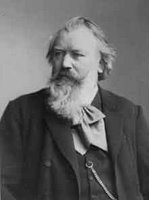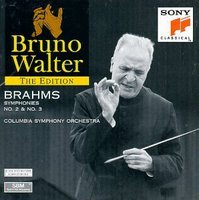
I open the listing with one of the centerpieces of my music world: the symphonies of Ludvig van Beethoven. As you probably already know there is no complete set from any conductor that could satisfy the 'supreme' measure, yet each symphony found supreme interpretations in one or more recordings. I will present my favorites here but be aware that I still have to listen to some of the 'famous' versions.
 Symphony no. 1, C Major, Op. 21
Symphony no. 1, C Major, Op. 21For this fresh and serious enthusiastic symphony I prefer Karajan in his '63 cycle (the best of his sets, as everybody agrees). The sound is great, the Berliners are in fabulous form and Karajan founds the best approach to it, getting it close to perfection (Bruno Walter is the alternative if you want to see a more mature and self-conscious teenager within this symphony).
Symphony no. 2, D-dur, Op. 36
Here again, Karajan is the best although I find Walter's added haviness and thoughtfulness much more appropriate than the in the first symphony and as a matter of fact I like his second part better. But overall, Karajan stays ahead with a unity of conception and of sound that is unsurpassed. You sure want to stay away from Klemperer who thinks much to seriously about this symphony than the bars bare it.
Symphony no. 3, E flat major, Op. 55, 'Eroica'
With this symphony we get to the cornerstone of Beethoven's symphonic cycle and to the most difficult of all, in terms of finding THE recording. However it found its master interpretation, in my opinion, in the hands of Bruno Walter. You'd prefer the Sony 20-bit mastering reissue for the better sound, yet no matter what the support the interpretation is the asolute Eroica. Close, but not close enough for me, come Klemperer, and, from a different angle, Bohm. We might want to listen to Giulini too, yet the desert island recording is that of Walter's, no doubt about it.
Symphony no. 4, D-dur, Op. 60
This is one symphony whete I have a real problem choosing between two versions. On one hand you have one of Furtwangler's versions, with the Berliners from 44, which at the time I first heard it was short of a miracle. I never believed that it can be played like that. The emotional intensity, the darkness of the opening and the gradual yet always intense exit from that darkness is something that you have to hear to believe. On the other hand there is Walter's redemption, the best for many, which is humanity itself with an unbreakable inner logic and beautiful phrasing and conception. I can't live without any of them.
Symphony no. 5, C, Op. 67
Undoubtedly the shiniest star of this wonderful galaxy in terms of popular acceptance, it is probably one the most difficult to get right. It's pretty straightforward as far as the message goes and it has to be extremely powerful without being screamy. That is why a 'conceptualist' like Klemperer doesn't get it quite right, making it too heavy. The three versions I have to pick all the time are: Furtwangler's 1944 version in Berlin, Karajan 63 version and the super-famous Kleiber version. It's hard to pick one yet I'd go first for Furtwangler because nobody else cand unravel what he can with such a diabolic power and insight. Close comes Kleiber and his incandescent yet highly ideatic redemption and in a close third Karajan, extremely powerful and intense with amazing playing from the Berliners. The fourth musketeer would be Walter who brings forward things missing elsewhere yet without the fire and the pure power that make this symphony what it is.
Symphony no. 6, F, Op. 68, 'Pastoral'
This is one with no dispute in my mind. There is no version that comes close to Walter's Columbia version. There
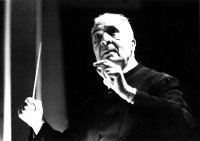
a lot of them that are beautiful and worth hearing (Bohm, Furtwangler, Klemperer) but none comes as close to perfect as Walter does. Is Dionissian in the absolute sense and all the fluids and energies of nature work together in the most wonderful way.
Symphony no. 7, A, Op. 92
I'll go again for Walter, although Kleiber, Karajan, and Furtwangler cannot be left aside by any means. The reason is energy, marveleous connectivity between parts and a touch of darkness that makes the apotheotic dance in the end to be the most Beethovenian on record. It comes on the same cd with his equally great 4th so it's a treat.
Symphony no. 8, F, Op. 93
Two choices here with an unexpected third. First start from quite different premises yet the restults are most rewarding. Karajan takes 'classic' style and gives it Beethovenian proportions. With, again, a wonderful orchestra the result is so convincing that makes it a must choice. Walter has a more genteel manner and sees the Viennese heritage yet the result is beautifull. It's truly almost impossible to choose. An excellent version, smartly detailed comes from Ormandy. Backed up by beautiful strings it is a version definitely woth having.
Symphony no. 9, D, Op. 125
Here again I have no doubt for the favorite. Although debated with at least another reading from the same conductor, Furt

wangler's Bayreuth version is for me The Ninth Symphony. The first time I have listened to it was scintillating. Everything made sense, all the 'thematic characters' were perfectly defined in a drama of larger than life proportions. You get immersed in the straggle of humanity with its own destiny in the most profound and revelatory way possible with a development that makes you think for a moment that you could've written the 'Ode to joy'. No other version manages to transcend the form and the content to another dimension. Furtwangler does this with ease and power, which I think it is his signature.
As you probably saw already if you make me recommend just one set I would probably go for Walter's, although Furtwangler's EMI set and Karajan's 1963 DG set would be up for considerations. If you want fabulous sound, or it is your first time you approach this music than you go for Karajan; if you think of Beethoven as the genius that had a fight with his destiny than I'd say Furtwangler, and if you think Beethoven is a man that understood more and loved humans for what they are and for what they are not than you better go for Bruno Walter. It's very unlikely you won't be satisfied.


 The symphony of the symphonies in the recording of the recordings.
The symphony of the symphonies in the recording of the recordings.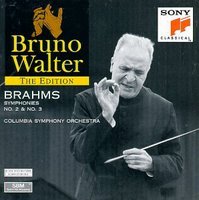 Walter seems to have had inside information on the making of these symphonies as he manages to reveal the core of Brahms feelings and intelect with utterly convincing power.
Walter seems to have had inside information on the making of these symphonies as he manages to reveal the core of Brahms feelings and intelect with utterly convincing power.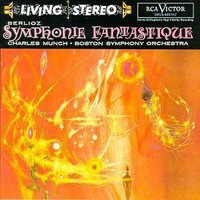 Munch is, without a shadow of a doubt, the owner of the most amazing version of this beautiful French symphony.
Munch is, without a shadow of a doubt, the owner of the most amazing version of this beautiful French symphony. The ultimate Don from a conductor that knows the secrets of Music and has the ability to reveal them with a cast that is as close to perfect as possible.
The ultimate Don from a conductor that knows the secrets of Music and has the ability to reveal them with a cast that is as close to perfect as possible.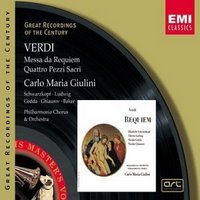 The undefineabe of the relationship between man and his Creator. See a full review here
The undefineabe of the relationship between man and his Creator. See a full review here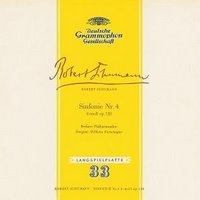 The emotional power, the fiery struggle and yet the flow and logic of a torrenting river. Unsurpassable.
The emotional power, the fiery struggle and yet the flow and logic of a torrenting river. Unsurpassable.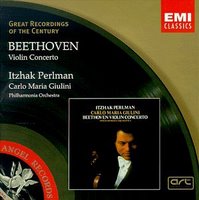 Hear a passionate and victorious spirit (Perlman) in a suffering and meditative body (Giulini).
Hear a passionate and victorious spirit (Perlman) in a suffering and meditative body (Giulini). The ultimate Beethoven piano concertos in an unearthy class of their own which only Furtwangler Fisher partnership managed to reach before. See full review here.
The ultimate Beethoven piano concertos in an unearthy class of their own which only Furtwangler Fisher partnership managed to reach before. See full review here.
